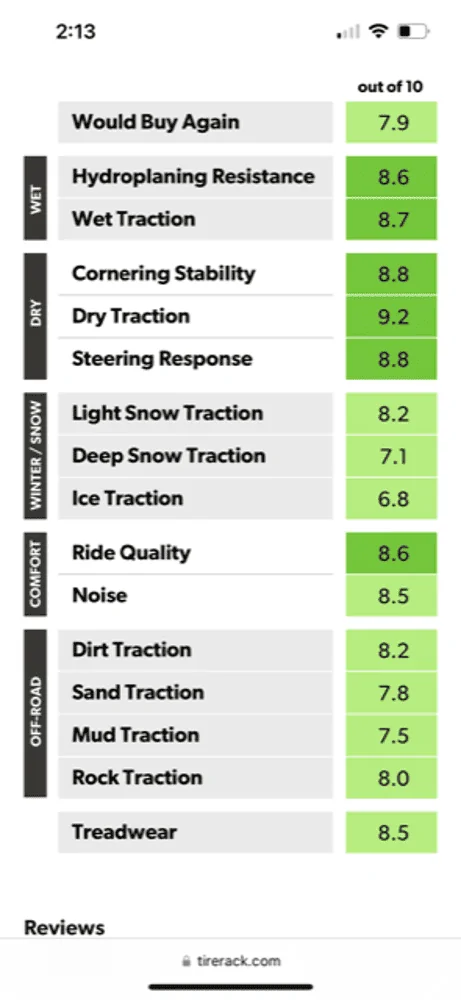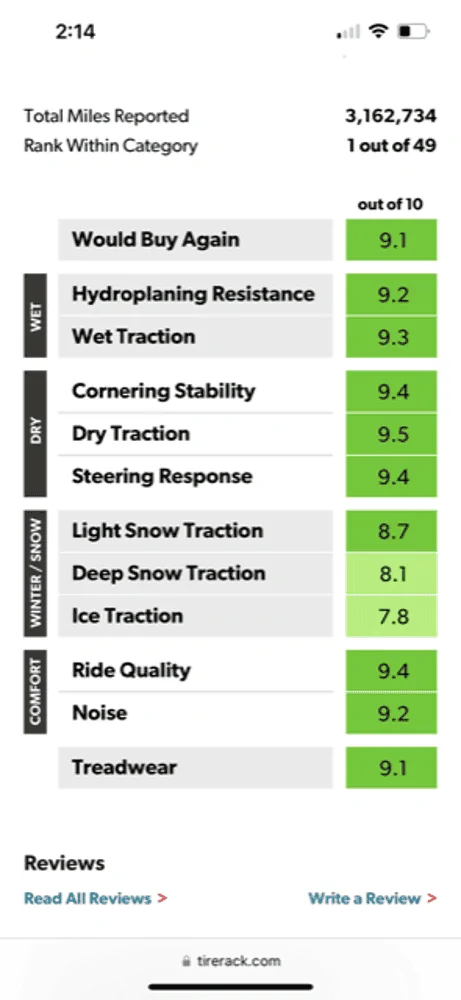Sponsored
Pdxguy
Well-known member
- First Name
- La
- Joined
- Nov 18, 2022
- Threads
- 13
- Messages
- 69
- Reaction score
- 86
- Location
- Portland, Oregon
- Vehicles
- Mustang Mach-E FE, Toyota Tacoma, Audi
Wanted to (as promised) give people a quick update on how my Pirelli Scorpion AS+ 3 all-weather tires are doing.
First, some context – I purchased these all weather tires as added security for driving in snow, and my family with 4 drivers already has 2 cars that have full-fledged winter tires we swap out twice a year. Did not want the hassle of doing this for a third vehicle, and instead opted to go with all-weather tires given two other cars will always have winter tires if needed, but wanted to set the truck up to give my wife confidence she could use it in snow if needed.
First, the tires have been outstanding. I live near Mt. Hood in Oregon, and they handle well on snow, rain or dry pavement. Drove them through Portland after a major storm where multiple vehicles blocked the roads or could not function, and the truck coasted through it all.
Below is the reason I picked these tires over the all-season General Grabber ones based on Tire Rack reviews, and why I’m not giving more detailed performance info as it’s covered already. Grabber tires that came with the truck are on the top, and Pirelli’s are on the bottom.
Unfortunately, I swapped out the tires in winter and did not have a chance to compare mileage between the two as I didn’t drive on the Grabber’s enough, but I did capture some efficiency based on wet or dry pavement and temperature, so those of you who want to consider this can review.
Stock tires that came with truck


Pirellis below
First, some context – I purchased these all weather tires as added security for driving in snow, and my family with 4 drivers already has 2 cars that have full-fledged winter tires we swap out twice a year. Did not want the hassle of doing this for a third vehicle, and instead opted to go with all-weather tires given two other cars will always have winter tires if needed, but wanted to set the truck up to give my wife confidence she could use it in snow if needed.
First, the tires have been outstanding. I live near Mt. Hood in Oregon, and they handle well on snow, rain or dry pavement. Drove them through Portland after a major storm where multiple vehicles blocked the roads or could not function, and the truck coasted through it all.
Below is the reason I picked these tires over the all-season General Grabber ones based on Tire Rack reviews, and why I’m not giving more detailed performance info as it’s covered already. Grabber tires that came with the truck are on the top, and Pirelli’s are on the bottom.
Unfortunately, I swapped out the tires in winter and did not have a chance to compare mileage between the two as I didn’t drive on the Grabber’s enough, but I did capture some efficiency based on wet or dry pavement and temperature, so those of you who want to consider this can review.
- Drive a 9 mile commute with mix of highway, streets and elevation in temperatures ranging from 38 degrees to 42 degrees AND numerous hills – 2.5 m/Kwh with wet pavement, 2.7 m/Kwh dry pavement. This commute tends to be downhill overall, and the return gets approximately 0.4 m/kwh reduction in all conditions.
- Same 9 mile commute with temperatures 52-65 degrees – and dry pavement 2.3-3.1 m/Kwh.
- Drive 85 miles on freeway at around 70 mph in temperatures ranging from 38-45 degrees on wet pavement – 1.6-1.8 m/kwh.
- Same drive with temperatures 55-8/0 degrees and dry pavement – 1.9-2.3 m/kwh.
Stock tires that came with truck


Pirellis below
sotek2345
Well-known member
- First Name
- Tom
- Joined
- Jun 7, 2021
- Threads
- 32
- Messages
- 3,805
- Reaction score
- 4,566
- Location
- Upstate NY
- Vehicles
- 2022 Lightning Lariat ER, 2021 Mach-e GT
- Occupation
- Engineering Manager
That sounds like exactly what I am looking for, but I don't see them in the right size or weight rating. What tire size did you get?Wanted to (as promised) give people a quick update on how my Pirelli Scorpion AS+ 3 all-weather tires are doing.
First, some context – I purchased these all weather tires as added security for driving in snow, and my family with 4 drivers already has 2 cars that have full-fledged winter tires we swap out twice a year. Did not want the hassle of doing this for a third vehicle, and instead opted to go with all-weather tires given two other cars will always have winter tires if needed, but wanted to set the truck up to give my wife confidence she could use it in snow if needed.
First, the tires have been outstanding. I live near Mt. Hood in Oregon, and they handle well on snow, rain or dry pavement. Drove them through Portland after a major storm where multiple vehicles blocked the roads or could not function, and the truck coasted through it all.
Below is the reason I picked these tires over the all-season General Grabber ones based on Tire Rack reviews, and why I’m not giving more detailed performance info as it’s covered already. Grabber tires that came with the truck are on the top, and Pirelli’s are on the bottom.
Unfortunately, I swapped out the tires in winter and did not have a chance to compare mileage between the two as I didn’t drive on the Grabber’s enough, but I did capture some efficiency based on wet or dry pavement and temperature, so those of you who want to consider this can review.
I realize my approximations are not scientific, but given all the variables of wind and pavement I combed through my records to give range that hopefully will allow people to make some decisions. Hope this helps those thinking of an all-weather snow tire. Based on my limited experience with the stock tires, I believe the range (at least for the commute) is similar, and there is no significant benefit to switch for that reason – but there is for the peace of mind in winter driving and reducing the hassle of storage and switching for pure winter tires. YMMV.
- Drive a 9 mile commute with mix of highway, streets and elevation in temperatures ranging from 38 degrees to 42 degrees AND numerous hills – 2.5 m/Kwh with wet pavement, 2.7 m/Kwh dry pavement. This commute tends to be downhill overall, and the return gets approximately 0.4 m/kwh reduction in all conditions.
- Same 9 mile commute with temperatures 52-65 degrees – and dry pavement 2.3-3.1 m/Kwh.
- Drive 85 miles on freeway at around 70 mph in temperatures ranging from 38-45 degrees on wet pavement – 1.6-1.8 m/kwh.
- Same drive with temperatures 55-8/0 degrees and dry pavement – 1.9-2.3 m/kwh.
Stock tires that came with truck


Pirellis below
Pdxguy
Well-known member
- First Name
- La
- Joined
- Nov 18, 2022
- Threads
- 13
- Messages
- 69
- Reaction score
- 86
- Location
- Portland, Oregon
- Vehicles
- Mustang Mach-E FE, Toyota Tacoma, Audi
I got the 275/60-20. They are at both TireRack, Discount Tire and Ford (where I got them as they had a great deal with free install plus 15k points). I believe the 20’inch rims are standard except for the Platinum?
Here’s the Tire rack link but I’d check with your dealer too.
https://www.tirerack.com/tires/tire...utoModel=F150 Lightning&autoModClar=275/60-20
Here’s the Tire rack link but I’d check with your dealer too.
https://www.tirerack.com/tires/tire...utoModel=F150 Lightning&autoModClar=275/60-20
geraulx
Member
If you only want to think about tires that are perfect for all-weather and snowdriving, then I would get the Bridgestone. I bought the WeatherPeak as last winter after debating between the Continental and CrossClimate2 (the Pilot Sport AS didn't exist then) and they are extremely hard in cold weather and almost dangerous in slush. The DWS has softer sidewalls and is overall less responsive, but that makes it a better winter tire. I put 20k miles on the Bridgestones since then and bought a dedicated winter wheel set with Dunlop WinterMaxx tires after the first snowfall.
Sponsored
Last edited:
Similar threads
- Replies
- 0
- Views
- 1,533

